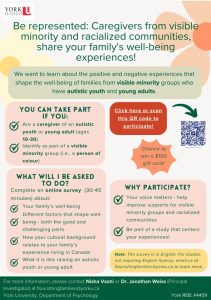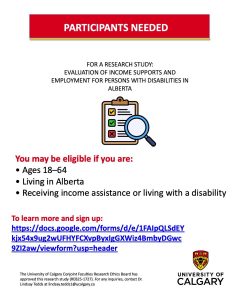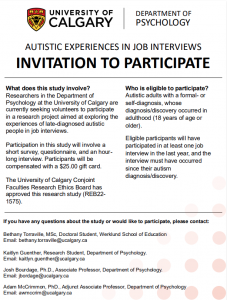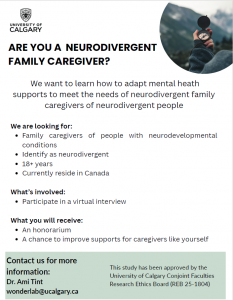This webpage lists studies that are currently accepting applications. Click on a green bar to learn more about the study and how to participate.
A University of Calgary doctoral researcher is inviting Autistic adults to help guide an upcoming dissertation project. The study explores how different types of autism-related language (such as clinical terms, identity-first, person-first, neutral, and neurodiversity-affirming language) shape identity, stigma, and social belonging.
The researcher is currently seeking two Autistic adults with an interest in research to join the project’s research committee. Committee members will help ensure the study is neuro-affirming, respectful, and guided by lived experience. This includes contributing to the development of interview questions and providing input on the study approach.
The role will include providing feedback on interview question development and offering guidance to support inclusive, neuro-affirming practices. If you are interested in shaping research about Autistic identity and language, this is a meaningful opportunity to contribute your expertise and lived experience.
Who is eligible to participate?
- Autistic adults with any level of research interest or experience
How can I participate?
If you would like to participate or want to learn more, please e-mail Brittany Lorentz at brittany.lorentz@ucalgary.ca
Expressions of interest to participate will be accepted until January 30, 2026.
The research team at York University (led by Dr. Jonathan Weiss) is conducting an online study about the positive experiences (flourishing) of visible minority families of Autistic youth and young adults (aged 10-30) living in Canada. They are interested in learning about the positive and negative experiences that shape the well-being of families from visible minority groups who have Autistic youth and young adults.
York REB: #4459.
Who is eligible to participate?
- A caregiver of an Autistic youth or young adult (ages 10-30)
- Identify as part of a visible minority group (i.e. a person of color)
What will I be asked to do?
- Complete an online survey (30-45 minutes) about:
- Your family’s well-being,
- Different factors that shape well-being, both the good and challenging parts,
- How your cultural background relates to your family’s experience living in Canada and,
- What it is like raising an Autistic youth or young adult.
- To thank you for your time, you will have a chance to win a $100 dollar gift card
How can I participate?
If you would like to participate, please fill out the survey.
For more information, please contact Nisha Vashi or Dr. Jonathan Weiss (Principal Investigator) at flourishingfamilies@yorku.ca
Expressions of interest to apply or participate, will be accepted until the end of January 2026.
To view the research poster, click on the image.

On February 4, 2025, the Alberta Government announced the creation of a new income support program, the “Alberta Disability Assistance Program” (ADAP) along with new employment supports. While details are yet to be confirmed, ADAP will be for low-income Albertans with disabilities “who are able work”. ADAP will exist alongside the Assured Income for the Severely Handicapped (AISH) program—the longstanding income assistance program for persons with severe and permanent disabilities in Alberta. ADAP is scheduled to launch in July 2026.
The purpose of this study is to examine the impact of ADAP and resultant employment impacts on income assistance clients and persons with disabilities. This study will also examine whether and how different measures of poverty can be used to improve policy design and evaluation in Alberta and Canada.
The University of Calgary Conjoint Faculties Research Ethics Board has approved this research study (REB25-1727).
Who is eligible to participate?
- Between 18 and 64 years old,
- Living in Alberta, and
- Either receiving income assistance (AISH, Income Support, or ADAP) or living with a disability
What will I be asked to do?
- Participants will be asked to answer a survey every six months ending December 2028.
- The survey questions are on: basic demographics, disability type and severity, employment situation, and ability to meet their and their households needs.
- Personal questions will be asked including questions about gender, income, culture, education, family composition, employment, disability type and severity, whether participants have/can access certain items and services, and their housing situation.
- Caregivers, support persons, and legal guardians are welcome to help eligible participants complete the survey. This can include reading questions aloud, helping fill in the answers, or supporting communication in another way. The decision to take part should always be made by the person themselves, and they can stop at any time.
How can I participate?
If you would like to participate, fill out the indication of interest form. For questions or to learn more, please e-mail Dr. Lindsay Tedds at lindsay.tedds1@ucalgary.ca.
To view the research study, please click on the poster.

Expressions of interest to participate will be accepted until April 30, 2026.
Researchers at University of Calgary are seeking volunteers to participate in a research project aimed at exploring the experiences of late-diagnosed Autistic people in job interviews. Autistic people experience much higher rates of underemployment, and job interviews are often one of the biggest obstacles.
Many programs have been created to help Autistic people learn interview skills, but these programs are usually designed without meaningful Autistic input. Because of that, they often teach Autistic people to hide or change their natural ways of communicating in order to seem more “neurotypical.” This is known as social camouflaging, and it can be harmful to Autistic people’s mental health and sense of identity.
This study aims to reorient the research on autism and job interviews such that emphasis is given to exploring the lived experiences of Autistic people.
The University of Calgary Conjoint Faculties Research Ethics Board has approved this research study (REB22-1575).
Who is eligible to participate?
- Autistic adults with a formal or self-diagnosis, whose diagnosis/discovery occurred in adulthood (18 years of age or older).
- Participated in at least one job interview in the last year, and the interview must have occurred since their autism diagnosis/discovery.
What will I be asked to do?
- You will be asked to complete a short survey, questionnaire, and an hour long interview. Participants will be compensated with a $25.00 gift card.
How can I participate?
If you would like to participate or need more information, please contact Bethany Torraville at bethany.torraville@ucalgary.ca. Expressions of interest to participate will be accepted until April 2026.
To view the research poster, click on the image.

The research team at University of Calgary (led by Dr. Ami Tint) are conducting a virtual study to better understand how they can adapt mental health supports to meet the needs of neurodivergent family caregivers of neurodivergent people. Specifically, they are planning to adapt the Caring for the Caregiver (CC-ACT) program for neurodivergent caregivers and seek your input on how best to achieve this.
This study has been approved by the University of Calgary Conjoint Faculties Research Ethics Board (REB 25-1804).
Who is eligible to participate?
- Family caregivers of people with neurodevelopmental conditions,
- Identify as neurodivergent,
- 18+ years of age,
- Currently reside in Canada.
What will I be asked to do?
- Participate in a virtual interview. As a token of appreciation, you will receive an honorarium for your time, and a chance to improve supports for caregivers like yourself.
How can I participate?
If you would like to participate or need more information, please contact Dr. Ami Tint at wonderlab@ucalgary.ca. Expressions of interest to participate will be accepted until April 2026.
To view the research poster, click on the image.
